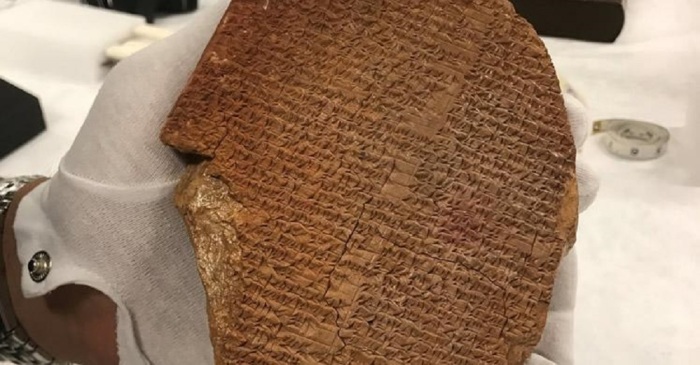US orders return of rare Gilgamesh Dream Tablet from Museum of the Bible

Federal authorities in New York filed a civil complaint Monday asking for the forfeiture of a rare artifact bearing a portion of an epic Sumerian poem known as the “Gilgamesh Dream Tablet” that was unlawfully acquired by an auction house and later sold to Hobby Lobby to be displayed at the Museum of the Bible in Washington, D.C.
According to ICE’s Homeland Security Investigations office in New York, the poem is considered one of the world’s oldest works of literature. The piece originated in the area of modern-day Iraq and authorities believe that is where the piece should be returned.
Authorities said once the artifact “entered the United States contrary to federal law,” it was sold by an international auction house, known as the Auction House, to Hobby Lobby Stores Inc. for display at the Museum of the Bible.
The museum, which opened in 2017, is chaired by Steve Green, the president of the Christian-owned arts-and-craft retailer Hobby Lobby.
According to the investigation, the Auction House withheld information about the artifact's provenance. The artifact was seized from the Museum of the Bible in September 2019.
“We are proud of our investigation that led to this reclaiming of a piece of Iraq’s cultural history,” Peter C. Fitzhugh, special agent in charge for HSI New York said in a statement.
“This rare tablet was pillaged from Iraq and years later sold at a major auction house, with a questionable and unsupported provenance.”
Fitzhugh assured that the HSI New York’s Cultural Property, Arts and Antiquity Investigations program “will continue to work with prosecutors to combat the looting of antiquities and ensure those who would attempt to profit from this crime are held accountable.”
Investigators contend that in 2003, a U.S. antiquities dealer purchased an encrusted cuneiform tablet from a Middle Eastern antiquities dealer in London. Experts in cuneiform later recognized the tablet as a portion of the Gilgamesh epic after it was imported and cleaned.

In the epic, the protagonist describes his dreams to his mother and she interprets the dreams as foretelling the arrival of a new friend. She tells her son, “You will see him and your heart will laugh,” authorities noted.
The antiquities dealer later sold the Gilgamesh Dream Tablet with a false provenance letter in 2007 that stated that the tablet was found inside a box of miscellaneous bronze fragments purchased in a 1981 auction.
According to the investigation, the false provenance letter traveled with the tablet and was provided to the Auction House by a later owner. Authorities say the Auction House’s antiquities director spoke with the antiquities dealer as part of their due diligence, and “the dealer informed the Auction House that the provenance would not withstand scrutiny and should not be used in connection with a public sale.”
The Auction House went against that advice, however, and told Hobby Lobby that the artifact had been acquired at an auction in 1981. Hobby Lobby purchased the tablet in a private sale in 2014.
When Hobby Lobby asked for more details in connection with the purchase and the museum expressed discomfort with the provenance in 2017, the Auction House told the museum that the antiquities dealer had confirmed the details of the provenance.
The Auction House did not share the false provenance letter and the antiquities dealer’s name with Hobby Lobby or the museum, the authorities say.
The Museum of the Bible cooperated with authorities in investigating the origins of the tablet.
“Whenever looted cultural property is found in this country, the United States government will do all it can to preserve heritage by returning such artifacts where they belong,” United States Attorney for the Eastern District of New York Richard P. Donoghue said in a statement.
“In this case, a major auction house failed to meet its obligations by minimizing its concerns that the provenance of an important Iraqi artifact was fabricated, and withheld from the buyer information that undermined the provenance’s reliability.”
In 2017, Hobby Lobby agreed to pay $3 million and forfeit thousands of biblical cuneiform tablets and clay bullae to settle a civil complaint the U.S. government filed against the company.
Green said in a statement on the museum’s website in March that he made many mistakes when he first started collecting items for display in the museum. But, he assured that he has been working to correct those mistakes. Green promised to return any items he finds among his collection that can be verified as stolen.
“In 2009, when I began acquiring biblical manuscripts and artifacts for what would ultimately form the collection at Museum of the Bible, I knew little about the world of collecting,” Green admitted. “It is well known that I trusted the wrong people to guide me, and unwittingly dealt with unscrupulous dealers in those early years. One area where I fell short was not appreciating the importance of the provenance of the items I purchased.”
Green said that the “early mistakes” resulted in the museum receiving a “great deal of criticism over the years.”
“The criticism resulting from my mistakes was justified,” he stressed. “My goal was always to protect, preserve, study, and share cultural property with the world. That goal has not changed, but after some early missteps, I made the decision many years ago that, moving forward, I would only acquire items with reliable, documented provenance.”
Green announced that the museum has identified approximately 5,000 papyri fragments and 6,500 clay objects “with insufficient provenance that we are working to deliver to officials in Egypt and Iraq respectively.” Green stressed that the museum has worked with officials in Egypt, Iraq and the U.S. to finalize deliveries.
“Furthermore, if I learn of other items in the collection for which another person or entity has a better claim, I will continue to do the right thing with those items,” Green assured.





























